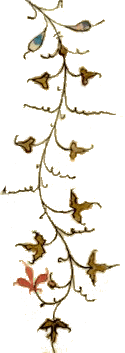I saw that the sightless genius, Homer, reached out blindly for the hand of my guide, which he found, eager, willing. The hand that had offered homage in writing now followed fervently in the caress of the flesh beneath the simple sheath. Acolyte served at the altar of the master with an eager mouth. Imagine my discomfort, in which I was quite alone, reader! For Horace turned to Lucan, and Ovid looked on, aroused but detached, and I sat, as superfluous as the quintary wheel on a cart, as intrusive as a foreign legion prowling the streets. And, too, as aroused as an adolescent boy, as I listened to the father of poetry crying frantic syllables in the Greek tongue.
Virgil raised his head and I froze, like a rabbit paralyzed in the grass, hoping his eyes might look right through me, but he was instantly aware of my fascination. In what seemed but a moment my master and my poet had placed his hands on my shoulders with a reassuring weight. He pressed me gently down on the turf.
His eyes and mien and silently moving lips asked of me if I would, and I could not deny that everything within me responded "si," as an eager boy who had been offered the object of his longing. I could not deny anything to my poet.
He stroked me tenderly, slowly, as one approaches a virgin, easing the fear of the marriage-bed. He stripped away cloth and applied hands and tongue as I gasped and saw Homer listening in the periphery of my disjointed vision. When he dipped his pen towards my well I was already so shameless and abandoned in aspect that I welcomed the pain amidst the exquisite fleshly pleasure. I murmured "Nunc scio quid sit amor," which seemed to please him.
I was aware, as I felt control slipping away from me, of Homer, rising and approaching our entwined forms sprawled on the grass. He wound his questing hands around the sleek torso of my master, who transfixed me still. Virgil moaned like a wanton woman, like I myself was moaning, and Homer himself added his antique accent to our throng.
I, the novice, was the first to cry out, clinging for Virgil as I was drawn, all of an instant, to what was surely Paradise. Virgil, with another movement, gave in to the same impulse and collapsed against my belly as Homer rode him as imperiously as a commander in battle. At last, Homer withdrew from his apprentice with a warm gush like a spurt of milk.
Now I knew not what to say, and was relieved when Virgil caressed me again, even as he bestowed a kiss on Homer. "We can tarry no further," he instructed when he broke away from Homer's lips. "Come, Dante."
And I followed, my head swimming with post-coital delights, as my guide led me from that green and pleasant region.

Notes:
Nunc scio quid sit amor -- "Now I know what love is." Dante pays Virgil the delicate complement of quoting from Virgil's Aeneid.
I owe a great deal of my understanding of them to the writing of Dorothy L. Sayers and the instruction of Prof. Freccero and Prof. Rutigliano. Not that they would necessarily endorse the genre of Divine Comedy slash unwittingly spawned. But still.
